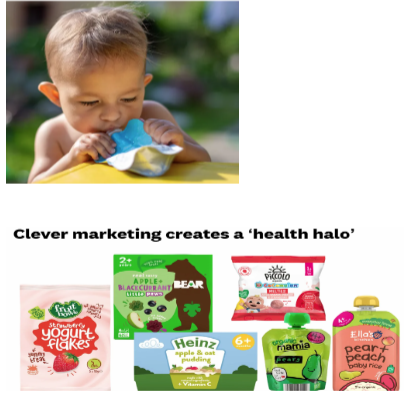The healthy baby foods that are full of sugar
News from BEUC which is the umbrella for European Consumer Association that ACR belongs to.
The healthy baby foods that are full of sugar
A 2025 report by nutrition experts at the University of Leeds, funded by Which? and Sustain, has raised concerns about the state of commercial baby foods. Many supermarket baby and toddler snacks are high in sugar, provide low-quality nutrition and are sold in excessive portion sizes – and some are encouraged for very young babies against established health guidelines, new research shows
A massive 89% of fruit products the researchers checked would warrant a high sugar warning under WHO guidance. These types of snacks are often also low in calories and essential nutrients such as fats and protein. Plus, the fact that they re puréed means they can be consumed quickly without chewing, which can encourage overeating.
Professor Janet Cade, who leads the Nutritional Epidemiology Group at the University of Leeds and worked on the study, says: “We need to help parents to protect young children because we know that diet in early life sets the scene for later health outcomes.”
For example, Ella’s Kitchen Pear & Peach Baby Rice contains just 3% rice and Heinz Apple Oat Pudding is just 1% oats. This information is on the back of the pack, but the main ingredient in both is fruit, rather than the grains mentioned in the name on the front.
Researchers also flagged use of terms such as nutritionally balanced by experts which implies products were inherently good for young children (but is ultimately meaningless), plus greenwashing tactics drawing attention to sustainability claims to create a positive and healthful overall image.
These included:
We make healthy snacks for children just as nature intended(Bear Paws Apple & Blackcurrant Fruit Shapes)
Fruit made fun (Fruit Bowl Strawberry Yogurt Flakes)
Nutritionist approved, always organic, nothing artificial (Piccolo Apple, Banana, Yoghurt and Strawberry Melties).
Many products contain sugar from ingredients such as concentrated apple or grape juice, often disguised by claims such as naturally occurring sugars or no added sugar.
When the researchers spoke to 1,000 parents via a survey and focus groups, the perception was that these products were well regulated and healthy, and parents were shocked to discover otherwise. Seven out of 10 parents surveyed agreed there should be front-of-pack warnings on products with high sugar levels. Official guidelines advise weaning from six months, but 20% of cereal products and 33% of fruit and vegetable products the researchers checked stated they were suitable from 4+ months.
The Leeds Baby Food report proposes that the UK adopts existing WHO guidance covering nutritional, marketing and packaging profiles (NPPM), alongside other recommendations from their research. These include:
Regulations to set maximum sugar levels for meals and snacks.
Products high in sugar should include a front-of-pack warning to clearly signpost information to parents and to close a loophole (products can’t rely on high fruit content to appear healthy).
More savoury snacks and meals. First weaning foods (six to 12 months) should include cereals, legumes, protein sources and fats rather than simple watery vegetable purées or sugar-rich fruit purées.
Minimum age of six months for all products.
Purées should be in rip or seal pouches or jars, rather than squeezy tubes or pouches. Manufacturers should avoid
unnecessary puréeing and increase product textures. Puréed foods should not be marketed for babies beyond 12 months. Pouches should have warnings not to eat from the pack. Advice for parents on healthier baby food choices
The Leeds Baby Food report includes tips for parents looking to improve the diet of their babies or toddlers:
Where possible, opt for simple, homemade food. Swap fruit pouches, jars or fruity porridge for homemade porridge, natural yoghurt and whole or sliced fruit, or wholemeal toast.
Choose savoury options, such as vegetable purée instead of fruit.
Give children soft fruit and other foods to help them learn to chew.
Avoid introducing food before six months, but ensure you move away from smooth, soft products once babies can handle more texture.


Leave a Reply